|
|
|
Sort Order |
|
|
|
Items / Page
|
|
|
|
|
|
|
| Srl | Item |
| 1 |
ID:
114996
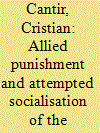

|
|
|
|
|
| Publication |
2011.
|
| Summary/Abstract |
This article makes theoretical and empirical contributions to the recent literature on the socialisation and punishment of state and non-state actors. First, it argues that the English School can add significantly to our understanding of the socialisation and punishment processes because of the theory's emphasis on great powers as 'custodians' of the society of states. Second, it analyses the policies of the United Kingdom, France, and, to a lesser degree, a number of other powers toward the Bolsheviks and the Whites during the Civil War and beyond (1917-1924). The basic argument is that London, Paris, and other capitals acted like 'guardians' of the society of states in their attempt to punish and socialise the participants in the Civil War.
|
|
|
|
|
|
|
|
|
|
|
|
|
|
|
|
| 2 |
ID:
141654
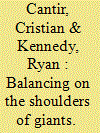

|
|
|
|
|
| Summary/Abstract |
“Soft balancing” has emerged as a way to reconcile realist theory with the lack of hard balancing behavior against US hegemony. Scholars continue, however, to disagree on the concept's utility and causes. Consistent with its realist roots, scholars have primarily focused on power imbalance and external threat to security as causes of soft balancing. This article analyzes Moldova's major foreign policy shift in the mid-2000s. It argues that this was a clear example of soft balancing and that it adds several important insights into the causes of soft balancing. While the power imbalance and external threat from Russia were persistent throughout Moldova's post-independence history, the country only adopted a soft balancing strategy once Russia posed a threat to the internal stability of the government and changes in EU policy created a permissive international environment for the strategy. Moreover, we argue that the domestic political environment played a key role in enabling the adoption of this strategy. This article therefore diversifies the analysis of the causes of soft balancing and provides a theoretical answer for the puzzle of Moldova's pro-Western turn in 2003.
|
|
|
|
|
|
|
|
|
|
|
|
|
|
|
|
| 3 |
ID:
111633
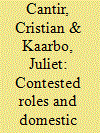

|
|
|
|
|
| Publication |
2012.
|
| Summary/Abstract |
Many of the strengths of research in Foreign Policy Analysis have been overlooked by role theorists. Role theorists often assume that roles are shared across elites and masses, that elites can manipulate masses, or that public opinion on roles constrains elites. Role theorists also tend to assume that there is a consensus among elites over national roles. Research in Foreign Policy Analysis, on the other hand, demonstrates that foreign policy may be contested both vertically (between elites and masses) and horizontally (among elites) and that these conflicts affect foreign policy decision making and foreign policy behavior. We propose that (i) contested roles mean that roles and foreign policy are not as stable as is often implied; (ii) research on contested roles offers Foreign Policy Analysis a less preference-oriented way of conceptualizing policy disagreements and decision making; and (iii) structures reveal themselves as important when agents use them in domestic discourse over contested roles, but the impact of international norm and role structures is not automatic, as it is shaped by the agents (and domestic structures) in the domestic political process. We suggest that research on the strategic use of roles could bring together these benefits of examining contested roles.
|
|
|
|
|
|
|
|
|
|
|
|
|
|
|
|
| 4 |
ID:
171780
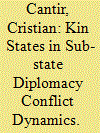

|
|
|
|
|
| Summary/Abstract |
How and why do diplomatic activities by sub-state units produce conflict with the central government? To answer this question, scholars have focused on multinational states in which at least one administrative unit—Catalonia, for instance—has an identity that is different from the rest of the country. Such noncentral governments (NCGs), the argument goes, are more likely to engage in uncoordinated bypassing activities and in the international projection of their specific identity in a manner that antagonizes central decision makers. That is especially the case if local elites are dissatisfied with the amount of local autonomy and the institutional tools available for identity protection. This article uses insights from the ethnic conflict and nationalism literature to advance sub-state diplomacy scholarship by adding a transnational dimension to the analysis. Three illustrative case studies—France-Canada-Quebec, Austria-Italy–South Tyrol, and Sweden-Finland–the Åland Islands—reveal that kin states can play a variety of roles in the triangular relationship with the kin NCG and the host state and can either exacerbate or dampen conflictual paradiplomacy. More broadly, the article is an effort to conceptualize the role of sovereign states in sub-state diplomacy.
|
|
|
|
|
|
|
|
|
|
|
|
|
|
|
|
| 5 |
ID:
126794


|
|
|
|
|
| Publication |
2013.
|
| Summary/Abstract |
Despite renewed interest in role theory and its promise to relate to agent-structure relationships, research in this area has underdeveloped notions of 'agency' and an incomplete understanding of the interaction between 'agency' and 'structure'. This problem can be attributed, in part, to the fact that the theory frequently overlooks the centrality of domestic political agents in the process of role conflict. An analysis of Danish decision-making over the country's involvement in Iraq and of Dutch decision-making over its involvement in Afghanistan illustrates the theoretical and empirical advantages of examining role conflicts with a focus on domestic politics. We conclude that studying role conflict as embedded in domestic political processes is important in the development of role theory in international relations research.
|
|
|
|
|
|
|
|
|
|
|
|
|
|
|
|
| 6 |
ID:
147969
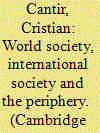

|
|
|
|
|
| Summary/Abstract |
Many studies of world society in the English School claim that non-state actors gain importance in international relations when they try to influence the most important members of the society of states. This article argues that such an approach overlooks the diversity of world society activities. First, it obscures the activities of world society actors beyond the core and therefore offers an incomplete account of the agency such actors exercise in global affairs. Second, it overlooks the fact that non-state actors from the core can disseminate some of the core’s values beyond its borders. The example of British abolitionist contact with the post-slave state of Haiti in the first two decades of the nineteenth century serves as an empirical illustration of these two points. The case study is particularly useful because conventional narratives of abolitionist activism tend to concentrate on contact with the core members of the society of states and overlook equally significant efforts to “teach” former slaves how to become respectable members of the society of states.
|
|
|
|
|
|
|
|
|
|
|
|
|
|
|
|
|
|
|
|
|